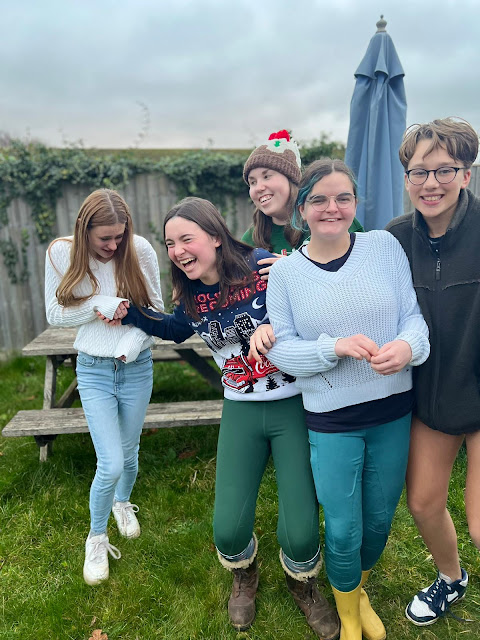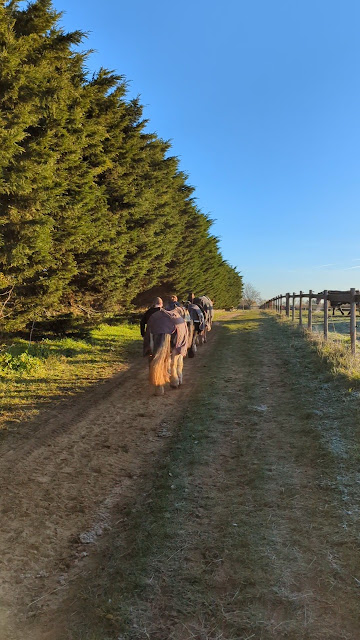Everything I've learned about RDA volunteers in 2023
 |
| Some festive fun with one of my Saturday co coaches, Sue |
1. Volunteers want to learn
I think this one is obvious if you stop to think about it. Volunteers rarely want to volunteer without developing some kind of skill. It's nice to give back, and it's nice to use existing skills to do this: it's even nicer to keep developing yourself, and I think this is one of our biggest pieces of ammo in retaining our volunteers. As a volunteer in a leadership role, I can't help but feel regret that there just aren't enough hours in my own RDA days to put into teaching volunteers new skills - or, indeed, to spend time honing the interesting but not pressing things I would love to learn myself. I've been snatching opportunities here and there all year to practice my plaiting skills, which I've really enjoyed. Overall, a culture of learning is an amazing thing for the organisation to support, and a great way for groups to invest in their volunteers.
2. Volunteers don't want it to feel like work - but they don't want it to feel too much not like work either
The majority of RDA volunteers will have experience of the workplace, whether current or past. I have often talked about the differences I feel in my relationship with my day job compared to my relationship with RDA: we do this stuff for free because it isn't work. Obviously. What I've started to realise over the years is that a lot of the ideas working-age volunteers have for improvements across the RDA community are actually to do with making the organisation more like a workplace. Not compulsory attendance, limited time off and cringeworthy social events, but things like slicker induction processes; clearer, more regular communication; accessible and easy to use policies; and easy ways to get in touch with the right person if you have a problem or a question. I'd know where to look up all of this stuff in my day job if I needed help with it: at RDA, I know many of us feel frustrated by having to take more of a piecemeal approach.
RDA groups often have very homespun roots, which are essential to the spirit and future legacy of the organisation. Volunteers in 2023, however, aren't going to stick around for another five decades if groups don't take enough steps to update the necessary parts of their operations. Groups are still businesses, even if they don't feel like typical ones. The dreams, aims, and essence don't have to change: that's what makes it not like going to work.
3. Volunteers are feeling more stretched
I've already written this year about RDA volunteering becoming a luxury. People are, on the whole, not as well off as they were previously: for time as well as money. Volunteers are much more likely to be squeezing in their RDA hours around other obligations than they are filling a huge void of free time. More so than ever, therefore, when people do fit in volunteering, they want it to be worth it. Volunteers also need more flexibility from their RDA commitments than perhaps we are used to: practically, this means we need more volunteers to maintain consistent levels of activity. If people say no doing extra as a volunteer, it's much more likely to be because they can't rather than because they won't.
 |
| Some of my volunteers at our Christmas party |
4. Volunteers need time to get to know each other - and our groups
I've spent more time watching the social dynamics of my volunteers this year than I ever have before. (As I'm friends with a lot of my volunteers, this probably sounds really creepy, but I swear it isn't...) Relationships are important to high-performing, happy teams. An RDA team is likely to be way more of a mixed bag than it is in the average workplace: I work with volunteers who are 14 up to retirement age, who come in with a massive variety of experience levels (of everything, not just horses!), communication and learning styles. It's actually a big ask to throw someone into that sort of environment and expect them to figure it out quickly.
It's testament to the type of people drawn to RDA that a lot of new volunteers are able to do this - but I also think it's important that we make time for people to get to know the people they are volunteering with, as well as our groups and the way they work. There are a lot of dynamics to negotiate which would be a shame for someone to misunderstand because they've come in expecting something else, or not knowing everything they need to. I've felt a big mindset shift in myself this year: I've been trying, where I can, to get to know my volunteers the way I do with new riders. I've had one of my riders become a volunteer this year, and two of my volunteers become riders - with them, I've enjoyed getting to know them in new, but connected, ways.
5. Volunteers give the most when they are invested emotionally
Volunteers come to RDA and, intentionally or not, will often end up falling in love with something. Maybe a horse or two, maybe working with a specific participant, maybe the whole team for their regular lesson. Maybe all of them! A lot of our most meaningful actions are powered by love, and volunteers are far more likely to give more if they are emotionally invested in their group. All a group needs to do is nurture that emotional investment as far as they can.
6. Volunteers want to know how it all works
Just that, really. A volunteer invested in a cause wants info, info, and more info. It's second only to genuine thanks in the "important things to give our volunteers" stakes. Volunteers want to know how they, as one cog, fit into the whole machine that is an RDA group: who else is powering it with them, how much do different things cost, how are donations being sent. I'm no scientist (or, indeed, engineer), but I'm pretty sure that volunteers empowered by this sort of knowledge are more likely to give back more to their groups, from time to fundraising to extra skills.
 |
| Recognising two coaches with their Christmas presents! |
7. Volunteers (usually) want to gain socially from their involvement with RDA
I've always enjoyed the social side of RDA myself, and it's no surprise at all that people want to get something out of the social side of volunteering: especially in a climate where our leisure time comes at such a high price. It turns out, I know very few volunteers at my group who aren't interested in the social side of things. Not everyone wants to socialise in big groups or even spend much time outside of the stables with fellow volunteers, but even the most introverted volunteers I know enjoy building relationships with others, sharing photos and stories of the horses, and generally feeling part of something. One of my volunteers pointed out to me a few weeks ago that she'd moved to the area from somewhere else, and as a result "this is the main part of my social life: I know hardly anyone around here". It comes down to the pressure on our free time: if we're using that for RDA, we want some fun for ourselves as well as helping other people.
I've had conversations with many people over the years where there has been thinly veiled horror expressed that volunteers want to use RDA as a social opportunity. If everything's still getting done, why not? I spend way too much of my spare time at RDA for it not to be an opportunity to socialise...
8. We can't underestimate how much RDA means to its volunteers
It's because of how different RDA volunteers can be that we can sometimes miss how much somebody values their involvement. You don't have to scream it from the rooftops - or write about it online - for your passion for the organisation to be real and meaningful. An hour a week spent at RDA can still be the highlight of someone's week; fifteen minutes a week spent grooming the same horse can be more than enough to develop a connection that means a lot to someone. I do not always know, or understand, the reasons behind the things that are most meaningful to my volunteers. Sometimes I joke about not understanding at all why a particular horse or job is their favourite. It's often only when you really start chatting to a volunteer when you realise quite how much it all means to them. That in itself is a special reason to keep investing in our volunteers.
9. Volunteers need looking after
...and this applies just as much to those of us who are volunteers coordinating or managing other volunteers. The generosity it takes to commit consistently to a cause like RDA is something very special indeed, and more so than ever, shouldn't be taken for granted. RDA doesn't work without its volunteer workforce, and won't be able to keep going into the future without it either. It's never been more important to listen, to encourage, and to hold on to our volunteers, and even as a volunteer myself I don't think I've always realised the value of doing these things proactively. I know I'll be trying my best at all three in 2024.
 |
| Volunteers hard at work |



Brilliant India
ReplyDelete